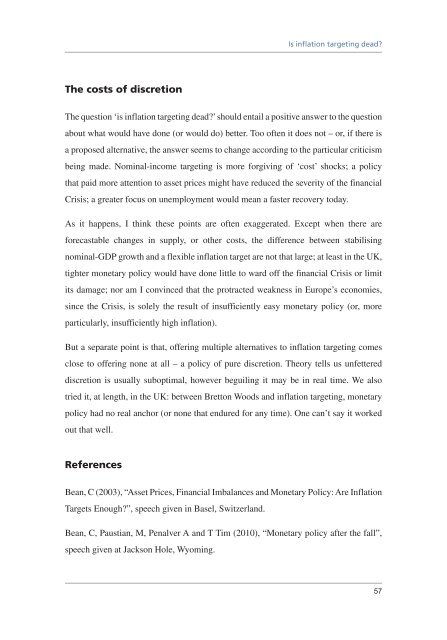Is inflation targeting dead? Central Banking After the Crisis - Vox
Is inflation targeting dead? Central Banking After the Crisis - Vox
Is inflation targeting dead? Central Banking After the Crisis - Vox
Create successful ePaper yourself
Turn your PDF publications into a flip-book with our unique Google optimized e-Paper software.
<strong>Is</strong> <strong>inflation</strong> <strong>targeting</strong> <strong>dead</strong>?The costs of discretionThe question ‘is <strong>inflation</strong> <strong>targeting</strong> <strong>dead</strong>?’ should entail a positive answer to <strong>the</strong> questionabout what would have done (or would do) better. Too often it does not – or, if <strong>the</strong>re isa proposed alternative, <strong>the</strong> answer seems to change according to <strong>the</strong> particular criticismbeing made. Nominal-income <strong>targeting</strong> is more forgiving of ‘cost’ shocks; a policythat paid more attention to asset prices might have reduced <strong>the</strong> severity of <strong>the</strong> financial<strong>Crisis</strong>; a greater focus on unemployment would mean a faster recovery today.As it happens, I think <strong>the</strong>se points are often exaggerated. Except when <strong>the</strong>re areforecastable changes in supply, or o<strong>the</strong>r costs, <strong>the</strong> difference between stabilisingnominal-GDP growth and a flexible <strong>inflation</strong> target are not that large; at least in <strong>the</strong> UK,tighter monetary policy would have done little to ward off <strong>the</strong> financial <strong>Crisis</strong> or limitits damage; nor am I convinced that <strong>the</strong> protracted weakness in Europe’s economies,since <strong>the</strong> <strong>Crisis</strong>, is solely <strong>the</strong> result of insufficiently easy monetary policy (or, moreparticularly, insufficiently high <strong>inflation</strong>).But a separate point is that, offering multiple alternatives to <strong>inflation</strong> <strong>targeting</strong> comesclose to offering none at all – a policy of pure discretion. Theory tells us unfettereddiscretion is usually suboptimal, however beguiling it may be in real time. We alsotried it, at length, in <strong>the</strong> UK: between Bretton Woods and <strong>inflation</strong> <strong>targeting</strong>, monetarypolicy had no real anchor (or none that endured for any time). One can’t say it workedout that well.ReferencesBean, C (2003), “Asset Prices, Financial Imbalances and Monetary Policy: Are InflationTargets Enough?”, speech given in Basel, Switzerland.Bean, C, Paustian, M, Penalver A and T Tim (2010), “Monetary policy after <strong>the</strong> fall”,speech given at Jackson Hole, Wyoming.57














